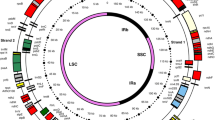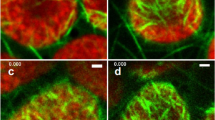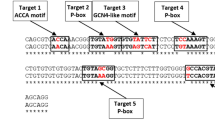Abstract
The small heat shock proteins (sHSPs) are induced in all eukaryotes in response to high temperature stress, but are most abundant among members of the plant kingdom where they accumulate in multiple subcellular compartments. We have analyzed the expression of the chloroplast-localized sHSP from Arabidopsis thaliana, HSP21, and characterized the structure of the gene encoding this protein to facilitate future genetic studies on the function of HSP21 in the heat shock response. HSP21 is encoded in Arabidopsis by a single gene whose coding region is interrupted by a single intron. Previous studies have shown that intron processing is disrupted by severe, abrupt heat stress but is protected by pretreatments that induce thermotolerance. The processing of the HSP21 transcript was investigated in response to an abrupt heat stress regime and a gradual heat stress regime, the latter of which is known to confer thermotolerance in plants. Under abrupt stress conditions the HSP21 transcript is somewhat longer than under gradual heat stress conditions. However, the molecular basis for the size difference is not impaired intron splicing, but rather a difference in the length of the poly(A) tail depending on the heat stress regime. The results suggest that an increase in poly(A) tail length may be a generalized response to severe, abrupt heat stress and that poly(A) tail metabolism may be one of numerous cellular processes normally protected in thermotolerant cells from the otherwise damaging effects of high temperature stress.
Similar content being viewed by others
References
Berger EM, Vitek MP, Morganelli CM (1985) Transcript length heterogeneity at the small heat shock protein genes of Drosophila. J Mol Biol 186:137–148
Bond U (1988) Heat shock but not other stress inducers leads to the disruption of a sub-set of snRNPs and inhibition of in vitro splicing in HeLa cells. EMBO J 7:3509–3518
Chen Q, Vierling E (1991) Analysis of conserved domains identifies a unique structural feature of a chloroplast heat shock protein. Mol Gen Genet 226:425–431
Chen Q, Lauzon LM, DeRocher AE, Vierling E (1990) Accumulation, stability, and localization of a major chloroplast heat-shock protein. J Cell Biol 110:1873–1883
Czarnecka E, Gurley WB, Nagao RT, Mosquera LA, Key JL (1985) DNA sequence and transcript mapping of a soybean gene encoding a small heat shock protein. Proc Natl Acad Sci USA 82:3726–3730
Czarnecka E, Nagao RT, Key JL, Gurley WB (1988) Characterization of Gmhsp26-A, a stress gene encoding a divergent heat shock protein of soybean: heavy-metal-induced inhibition of intron processing. Mol Cell Biol 8:1113–1122
Dean C, Tamaki S, Dunsmuir P, Favreau M, Katayama C, Dooner H, Bedbrook J (1986) mRNA transcripts of several plant genes are polyadenylated at multiple sites in vivo. Nucleic Acids Res 15:2229–2240
Dean C, Favreau M, Dunsmuir P, Bedbrook J (1987) Confirmation of the relative expression levels of the Petunia (Mitchell) rbcS genes. Nucleic Acids Res 15:4655–4668
DeRocher AE, Helm KW, Lauzon LM, and Vierling E (1991) Expression of a conserved family of cytoplasmic low molecular weight heat shock proteins during heat stress and recovery. Plant Physiol 96:1038–1047
Feinberg AP, Vogelstein B (1983)A technique for radio-labeling DNA to high specific activity. Anal Biochem 132:36–38
Gurley WB, Key JL (1991) Transcriptional regulation of the heat-shock response: a plant perspective. Biochemistry 30:1–12
Helm KW, Vierling E (1989) An Arabidopsis thaliana cDNA clone encoding a low molecular weight heat shock protein. Nucleic Acids Res 17:79–95
Howarth CJ (1991) Molecular responses of plants to an increased incidence of heat shock. Plant Cell Environ 14:831–841
Jackson RJ, Standart N (1990) Do the poly(A) tail and 3′ untranslated region control mRNA translation? Cell 62:15–24
Joshi CP (1987) Putative polyadenylation signals in nuclear genes of higher plants: a compilation and analysis. Nucleic Acids Res 15:9627–9640
Key JL, Nagao RT, Czarnecka E, Gurley WB (1987) Heat stress: expression and structure of heat shock protein genes. In: Chua N-H, von Wettstein B (eds) Plant molecular biology. Plenum Press, New York, pp 387–397
Kimpel JA, Key JL (1985) Presence of heat shock mRNAs in field grown soybeans. Plant Physiol 79:672–678
Kimpel JA, Nagao RT, Goekjian V, Key JL (1990) Regulation of the heat shock response in soybean seedlings. Plant Physiol 94:988–995
Kraft R, Tardiff J, Krauter KS, Leinwand LA (1988) Using miniprep plasmid DNA for sequencing double stranded templates with Sequenase™. BioTechniques 6:544–546
Lin C-Y, Roberts JK, Key JL (1984) Acquisition of thermotolerance in soybean seedlings. Synthesis and accumulation of heat shock proteins and their cellular localization. Plant Physiol 74:152–160
Lindquist S (1986) The heat-shock response. Annu Rev Biochem 55:1151–1191
Lindquist S, Craig EA (1988) The heat shock proteins. Annu Rev Genet 22:631–677
Lis JT, Xiao H, Perisic O (1990) Modular units of heat shock regulatory regions: structure and function. In: Morimoto RI, Tissieres A, Georgopoulos C (eds) Stress proteins in biology and medicine. Cold Spring Harbor Laboratory, Cold Spring Harbor, New York, pp 411–428
Maniak M, Nellen W (1988) A developmentally regulated membrane protein gene in Dictyostelium discoideum is also induced by heat shock and cold shock. Mol Cell Biol 8:153–159
Minchiotti G, Gargano S, Maresca B (1991) The intron-containing hsp82 gene of the dimorphic fungus Histoplasma capsulatum is properly spliced in severe heat shock conditions. Mol Cell Biol 11:5624–5630
Mogen BD, MacDonald MH, Graybosch R, Hunt AG (1990) Upstream sequences other than AAUAAA are required for efficient messenger RNA 3′-end formation in plants. Plant Cell 2:1261–1272
Nagao RT, Czarnecka E, Gurley WB, Schöffl F, Key JL (1985) Genes for low-molecular-weight heat shock proteins of soybeans: sequence analysis of a multigene family. Mol Cell Biol 5:3417–3428
Nagao RT, Kimpel JA, Vierling E, Key JL (1986) The heat shock response: a comparative analysis. Oxf Surv Plant Mol Cell Biol 3:384–438
Nash J, Walbot V (1992) Bronze-2 gene expression and intron splicing patterns in cells and tissues of Zea mays L. Plant Physiol 100:464–471
Nover L (1991) Chromatin structure, transcription, and pre-mRNP splicing. In: Nover L (ed) Hat shock response. CRC Press, Boca Raton, Florida, pp 263–279
Raschke E, Baumann G, Schöffl F (1988) Nucleotide sequence analysis of soybean small heat shock protein genes belonging to two different multigene families. J Mol Biol 199:549–557
Russnak RH, Candido EPM (1985) Locus encoding a family of small heat shock genes in Caenorhabditis elegans: two genes duplicated to form a 3.8-kilobase inverted repeat. Mol Cell Biol 5:1268–1278
Sachs A (1990) The role of poly(A) in the translation and stability of mRNA. Curr Opin Cell Biol 2:1092–1098
Salĺes FJ, Darrow AL, O'Connell ML, Strickland S (1992) Isolation of novel murine maternal mRNAs regulated by cytoplasmic polyadenylation. Genes Dev 6:1202–1212
Sambrook J, Fritsch EF, Maniatis T (1989) Molecular cloning. Cold Spring Harbor Laboratory, Cold Spring Harbor, New York
Sanchez Y, Lindquist SL (1990) HSP104 required for induced thermotolerance. Science 248:1112–1115
Schöffl F, Raschke E, Nagao RT (1984) The DNA sequence analysis of soybean heat-shock genes and identification of possible regulatory promoter elements. EMBO J 3:2491–2497
Sinibaldi RM, Mettler IJ (1991) Intron splicing and intron-mediated enhanced expression in monocots. In: Cohn WE, Moldave K (eds) Progress in nucleic acid research and molecular biology, vol 42. Academic Press, San Diego, California, pp 229–257
Sorger PK (1991) Heat shock factor and the heat shock response. Cell 65:363–366
Takahashi T, Komeda Y (1989) Characterization of two genes encoding small heat-shock proteins in Arabidopsis thaliana. Mol Gen Genet 219:365–372
Takahashi T, Naito S, Komeda Y (1992) Isolation and analysis of the expression of two genes for the 81 kD heat-shock protein from Arabidopsis. Plant Physiol 99:383–390
Vierling E (1991) The roles of heat shock proteins in plants. Annu Rev Plant Physiol Plant Mol Biol 42:579–620
Vierling E, Key JL (1985) Ribulose 1,5-bisphosphate carboxylase synthesis during heat shock. Plant Physiol 78:155–162
Vierling E, Nagao RT, DeRocher AE, Harris LM (1988) A heat shock protein localized to chloroplasts is a member of a eukaryotic superfamily of heat shock proteins. EMBO J 7:575–581
Vierling E, Harris LM, Chen Q (1989) The major low-molecular-weight heat shock protein in chloroplasts shows antigenic conservation among diverse higher plant species. Mol Cell Biol 9:461–468
Welch WJ (1990) The mammalian stress response: cell physiology and biochemistry of stress proteins. In: Morimoto RI, Tissieres A, Georgopoulos C (eds) Stress proteins in biology and medicine. Cold Spring Harbor Laboratory, Cold Spring Harbor, New York, pp 223–278
Wickens M (1990a) How the messenger got its tail: addition of poly(A) in the nucleus. Trends Biochem Sci 15:277–281
Wickens M (1990b) In the beginning is the end: regulation of poly(A) addition and removal during early development. Trends Biochem Sci 15:320–324
Winter J, Wright R, Duck N, Gasser C, Fraley R, Shah D (1988) The inhibition of petunia hsp70 mRNA processing during CdCl2 stress. Mol Gen Genet 211:315–319
Wu CH, Caspar T, Browse J, Lindquist S, Somerville C (1988) Characterization of an HSP70 cognate gene family in Arabidopsis. Plant Physiol 88:731–740
Yansura DG (1990) Expression as trpE fusion. Methods Enzymol 185:161–166
Yost HJ, Lindquist S (1986) RNA splicing is interrupted by heat shock and is rescued by heat shock protein synthesis. Cell 45:185–193
Yost HJ, Lindquist S (1988) Translation of unspliced transcripts after heat shock. Science 242:1544–1548
Yost HJ, Lindquist S (1991) Heat shock proteins affect RNA processing during the heat shock response of Saccharomyces cerevisiae. Mol Cell Biol 11:1062–1068
Author information
Authors and Affiliations
Additional information
Communicated by E. Meyerowitz
Rights and permissions
About this article
Cite this article
Osteryoung, K.W., Sundberg, H. & Vierling, E. Poly(A) tail length of a heat shock protein RNA is increased by severe heat stress, but intron splicing is unaffected. Molec. Gen. Genet. 239, 323–333 (1993). https://doi.org/10.1007/BF00276930
Received:
Accepted:
Issue Date:
DOI: https://doi.org/10.1007/BF00276930




